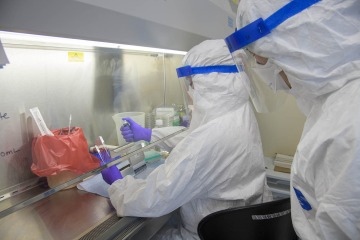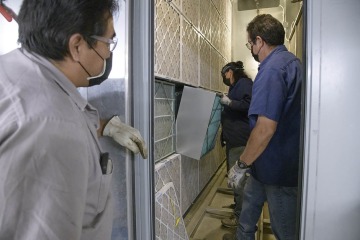Aegis Consortium Leaders Envision a Pandemic-Free Future
A new initiative seeks to unite global experts from universities, government agencies, nonprofits and industry to develop solutions to future pandemics.

One death every 10 seconds for roughly two years. That is the equivalent of the toll the world has paid since an unknown virus surfaced in one of the most populous cities in China. The novel coronavirus, dubbed SARS-CoV-2, quickly spread from continent to continent as doctors, scientists and world leaders grappled with how to address the viral disease now known as COVID-19.
From the pandemic’s earliest days, faculty, staff and students at the University of Arizona Health Sciences contributed to the fight against COVID-19 on several fronts.

Members of the Aegis Consortium are working to develop new therapies and methods to protect vulnerable populations now, while using the knowledge gained during this pandemic to prepare for – and hopefully prevent – future pandemics.
Immunobiologists developed one of the most accurate antibody tests in the world and discovered answers about lasting immunity. Epidemiologists tracked positive cases, changing symptoms and the effectiveness of COVID-19 vaccines. Educators prepared students to become health care professionals amid a global pandemic. Public health professionals worked hand in hand with rural and underserved communities to mitigate the effects of the virus.
Two years later, the world is inching ever closer to the tipping point when COVID-19 will become an endemic disease. The resulting stability in infection rates and transmissibility will effectively signal the end of the pandemic, but for UArizona Health Sciences, the real work is just beginning.
The Aegis Consortium, a new strategic initiative at the academic medical center, is uniting experts from across disciplines, government agencies, communities and industries around the world to build upon lessons learned from SARS-CoV-2 and COVID-19. Their goal? To create a pandemic-free future.
“We have learned a lot about the coronavirus and COVID-19, but there is still more to learn,” said Janko Nikolich-Žugich, MD, PhD, director of the Aegis Consortium, professor and head of the Department of Immunobiology at the UArizona College of Medicine – Tucson. “We do know that this will not be the last pandemic we see. The Aegis Consortium is uniting experts in research, technology and innovation to develop solutions that protect the world from future pandemics.”
Pandemic control, prediction and preparedness
As of mid-February, COVID-19 has killed more than 5.8 million people. The viral disease has been identified in nearly every country in the world, and Worldometer reports a global total of more than 413 million cases and counting. The milestones have been grim: on Sept. 20, 2021, deaths from COVID-19 in the U.S. surpassed those from the 1918 Spanish flu, previously the country’s worst pandemic-related death total on record. Less than five months later, U.S. deaths exceeded 900,000 – a number that continues to rise.
“We firmly believe the Aegis Consortium has the potential to change the way the world prepares for and mitigates the impact of infectious diseases that may be decades away or just over the horizon,” said Michael D. Dake, MD, senior vice president for UArizona Health Sciences.

Studies of immunity and virus evolution will address critical fundamental and practical gaps in knowledge regarding immunity to SARS-COV-2, with special focus on older adults.
As part of the Aegis Consortium, a statewide collaboration of doctors, scientists and other researchers are focusing on quantifying extended illnesses associated with COVID-19. Dr. Nikolich-Žugich is leading the effort to study the long-term effects of COVID-19 as part of the National Institutes of Health’s Researching COVID to Enhance Recovery (RECOVER) initiative.
The goals of RECOVER are to understand, treat and prevent post-acute sequelae of SARS-CoV-2 infection (PASC). Long COVID is a form of PASC and refers to symptoms that persist for weeks or months after the acute infection.
In addition to RECOVER, Aegis Consortium members are studying the immune responses to SARS-CoV-2 in various groups of people, specifically older adults. The team also is examining the virus’s escape potential, or its ability to evade the immune system, and the probability of reinfection.
The knowledge researchers gain about the coronavirus and COVID-19 can be used to develop new therapies and methods to protect vulnerable populations now, while also providing a framework for future pandemics.
“The Aegis Consortium is working to identify new pandemic threats before they strike. We are building a robust virus evolution and escape prediction system that will allow us to create new models of care delivery and community coordination,” said Dr. Nikolich-Žugich, who is co-director of the UArizona Center on Aging and a member of the university’s BIO5 Institute.
Post-acute effects of pandemics on individuals and societies
Under the second of the Aegis Consortium’s three areas of focus, researchers will address the intermediate and delayed impact of virus-related disruptions of social, educational and economic activities.

A comprehensive and effective public health response is vital to keep communities, especially underserved groups and those in rural areas, safe in the face of new pandemics.
Many of the pandemic’s effects are visible and quantifiable, such as disruptions to the global economy and supply chains, and rising levels of poverty. According to the Congressional Research Service, as many as 75 million people may have entered extreme poverty in 2020, with 80 million more undernourished compared to pre-pandemic levels. These problems are not only devastating by themselves, but also provide fertile ground for virus escape, recombination and the creation of new variants.
At the individual and societal levels, mental health issues, addiction and social unrest are less measurable but equally as destructive effects of the ongoing pandemic.
The long-term effects of the pandemic are unknown. Through the Aegis Consortium, wearable sensors will help researchers track the secondary and long-term effects of COVID-19, while social scientists are developing tools to model human emotions and behavior during pandemics.
Specific research projects are being developed to understand the impact of K-12 school closures on children. Early research suggests that many children fell behind academically while also facing social isolation that resulted in increased loneliness and suicidal thoughts, especially among teenagers. Children with developmental disabilities and those with racial and economic disparities were disproportionately affected by widespread and lengthy school closures.

Understanding and optimizing the built environment during a pandemic requires a transdisciplinary approach that addresses not only technical solutions, but also behavior, systems and policy solutions.
“Arizona students in several districts experienced some of the longest school closures of any state, and teachers and parents are voicing their concerns,” said Jim Buizer, PhD, associate director of the Aegis Consortium, director of the Arizona Institutes for Resilience and a professor in the UArizona College of Agriculture and Life Sciences. “To address those concerns, we need to better understand how pandemic-related school changes affected children and their education, and how we can do better in the future.”
Hospitals also were severely impacted by the pandemic. Aegis Consortium collaborators are examining why some hospitals dealt with the influx of patients and medical uncertainty better than others to improve hospital preparedness and health outcomes in the future.
Resilience of built and natural environments in pandemic control
As researchers raced to identify how the coronavirus spread, one thing was clear: environment matters. It has become increasingly clear that the built environment – the buildings in which we live, work and play – can be part of the solution or part of the problem during a pandemic.
Still, little is known about how the environment influences human vulnerability and resiliency. Aegis Consortium collaborators are investigating how the coronavirus and its human hosts change depending on different indoor and outdoor environments and how the built environment can be altered to promote resilience.
Individual projects will examine the use of adaptive design in buildings, create a building index system to rate the risk of infection, develop new technologies to reduce the spread of infectious diseases in the built environment, and find ways to detect SARS-CoV-2 in the air in real time.

For one Aegis Consortium project, researchers are collaborating with senior living associations and developers to survey older adults about the impact of the pandemic on their lives and families.
Two issues critical to older adults are aging-in-place and senior living facilities. Older adults were disproportionately affected by COVID-19, and mandatory quarantines posed unique and significant threats to their health and quality of life. In collaboration with the UArizona Center on Aging, Aegis Consortium members aim to develop strategies to make senior living more resilient in the face of future pandemic threats.
“We are combining our expertise in creating smart and adaptive built environments with innovative ways of delivering state-of-the-art health care at home to ensure that older adults, wherever they choose to live, are protected from the devastating effects of pandemics,” said Mindy J. Fain, MD, co-director of the UArizona Center on Aging and a professor in the College of Medicine – Tucson’s Department of Medicine.
The Aegis Consortium’s three-pronged proactive approach is designed to find immediate solutions to mitigate the effects of COVID-19 while putting in place mechanisms and strategies to predict and stave off new pandemics. The consortium’s leaders say they are convinced that, working together across universities, foundations, nonprofits, governments, communities and industries around the world, a pandemic-free future is achievable.
Contact
Stacy Pigott
520-621-7239
spigott@arizona.edu

